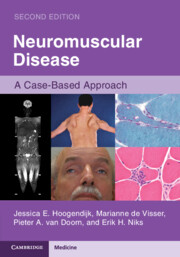Book contents
- Neuromuscular Disease: A Case-Based Approach
- Neuromuscular Disease
- Copyright page
- Contents
- Contributors
- Foreword
- Preface to 2nd Edition
- Part I Evaluation and Treatment of Patients with a Neuromuscular Disorder
- Part II Neuromuscular Cases
- Disorders of the Anterior Horn Cell
- Peripheral Neuropathies
- Disorders of the Neuromuscular Junction
- Myopathies
- Case 36 Duchenne Muscular Dystrophy (DMD)
- Case 37 Becker Muscular Dystrophy (BMD)
- Case 38 Facioscapulohumeral Muscular Dystrophy (FSHD)
- Case 39 Myotonic Dystrophy Type 1 (DM1)
- Case 40 Myotonic Dystrophy Type 2 (DM2)
- Case 41 Limb Girdle Muscular Dystrophy (LGMD) R1, Calpain-Related
- Case 42 Limb Girdle Muscular Dystrophy (LGMD) R9, FKRP-Related
- Case 43 Bethlem Myopathy, a Collagen VI-Related Myopathy (LGMDD5); Ullrich Congenital Muscular Dystrophy
- Case 44 Oculopharyngeal Muscular Dystrophy (OPMD)
- Case 45 Emery–Dreifuss Muscular Dystrophy (EDMD)
- Case 46 Caveolinopathy, Rippling Muscle Disease
- Case 47 Distal Myopathies: Miyoshi Myopathy, Dysferlinopathy; Anoctaminopathy
- Case 48 Distal Myopathies: GNE Myopathy
- Case 49 Myofibrillar Myopathies: Desminopathy
- Case 50 Skeletal Muscle Channelopathies: Non-Dystrophic Myotonia; Myotonia Congenita (Becker)
- Case 51 Skeletal Muscle Channelopathies: Hypokalaemic Periodic Paralysis
- Case 52 Pompe Disease (Glycogen Storage Disease (GSD) Type II; α-Glucosidase Deficiency)
- Case 53 McArdle Disease (Glycogen Storage Disease (GSD) Type V); Myophosphorylase Deficiency, Rhabdomyolysis
- Case 54 Carnitine Palmitoyltransferase-II (CPT2) Deficiency
- Case 55 Mitochondrial Myopathies: Chronic Progressive External Ophthalmoplegia (CPEO)
- Case 56 Ryanodine Receptor 1 (RYR1)-Related Disorders
- Case 57 Congenital Myopathies: X-Linked Myotubular Myopathy
- Case 58 Congenital Myopathies: Nemaline Myopathy
- Case 59 Juvenile Dermatomyositis (JDM)
- Case 60 Dermatomyositis (DM)
- Case 61 Immune-Mediated Necrotizing Myopathy (IMNM)
- Case 62 Inclusion Body Myositis (IBM)
- Case 63 Endocrine Myopathy: Hypothyroid Myopathy; Hyperthyroid Myopathy
- Case 64 Drug-Induced Myopathies: Hydroxychloroquine Myopathy
- Case 65 A- or Paucisymptomatic HyperCKaemia
- Cases 66 Exertional Rhabdomyolysis
- Video legends
- Index
- References
Case 65 - A- or Paucisymptomatic HyperCKaemia
from Myopathies
Published online by Cambridge University Press: 29 November 2024
- Neuromuscular Disease: A Case-Based Approach
- Neuromuscular Disease
- Copyright page
- Contents
- Contributors
- Foreword
- Preface to 2nd Edition
- Part I Evaluation and Treatment of Patients with a Neuromuscular Disorder
- Part II Neuromuscular Cases
- Disorders of the Anterior Horn Cell
- Peripheral Neuropathies
- Disorders of the Neuromuscular Junction
- Myopathies
- Case 36 Duchenne Muscular Dystrophy (DMD)
- Case 37 Becker Muscular Dystrophy (BMD)
- Case 38 Facioscapulohumeral Muscular Dystrophy (FSHD)
- Case 39 Myotonic Dystrophy Type 1 (DM1)
- Case 40 Myotonic Dystrophy Type 2 (DM2)
- Case 41 Limb Girdle Muscular Dystrophy (LGMD) R1, Calpain-Related
- Case 42 Limb Girdle Muscular Dystrophy (LGMD) R9, FKRP-Related
- Case 43 Bethlem Myopathy, a Collagen VI-Related Myopathy (LGMDD5); Ullrich Congenital Muscular Dystrophy
- Case 44 Oculopharyngeal Muscular Dystrophy (OPMD)
- Case 45 Emery–Dreifuss Muscular Dystrophy (EDMD)
- Case 46 Caveolinopathy, Rippling Muscle Disease
- Case 47 Distal Myopathies: Miyoshi Myopathy, Dysferlinopathy; Anoctaminopathy
- Case 48 Distal Myopathies: GNE Myopathy
- Case 49 Myofibrillar Myopathies: Desminopathy
- Case 50 Skeletal Muscle Channelopathies: Non-Dystrophic Myotonia; Myotonia Congenita (Becker)
- Case 51 Skeletal Muscle Channelopathies: Hypokalaemic Periodic Paralysis
- Case 52 Pompe Disease (Glycogen Storage Disease (GSD) Type II; α-Glucosidase Deficiency)
- Case 53 McArdle Disease (Glycogen Storage Disease (GSD) Type V); Myophosphorylase Deficiency, Rhabdomyolysis
- Case 54 Carnitine Palmitoyltransferase-II (CPT2) Deficiency
- Case 55 Mitochondrial Myopathies: Chronic Progressive External Ophthalmoplegia (CPEO)
- Case 56 Ryanodine Receptor 1 (RYR1)-Related Disorders
- Case 57 Congenital Myopathies: X-Linked Myotubular Myopathy
- Case 58 Congenital Myopathies: Nemaline Myopathy
- Case 59 Juvenile Dermatomyositis (JDM)
- Case 60 Dermatomyositis (DM)
- Case 61 Immune-Mediated Necrotizing Myopathy (IMNM)
- Case 62 Inclusion Body Myositis (IBM)
- Case 63 Endocrine Myopathy: Hypothyroid Myopathy; Hyperthyroid Myopathy
- Case 64 Drug-Induced Myopathies: Hydroxychloroquine Myopathy
- Case 65 A- or Paucisymptomatic HyperCKaemia
- Cases 66 Exertional Rhabdomyolysis
- Video legends
- Index
- References
Summary
A 44-year-old man was referred because of hyperCKaemia (elevated CK activity). CK ranged from 1300 to 2200 IU/L (normal < 171). Before referral some investigations were performed. TSH was normal. HyperCKaemia was initially considered to be related to the use of simvastatin, but four months after withdrawal of this drug, CK was still markedly elevated.
He did not complain about muscle weakness, muscle cramps, or myalgia. Previous history disclosed diabetes mellitus type 2, hypertension, and Asperger syndrome. Medication included metoprolol/hydrochlorothiazide, enalapril, and metformin. Family history was negative for neuromuscular disorders.
Keywords
- Type
- Chapter
- Information
- Neuromuscular DiseaseA Case-Based Approach, pp. 266 - 268Publisher: Cambridge University PressPrint publication year: 2024

